Boston Steps Up Fight Against Climate Change
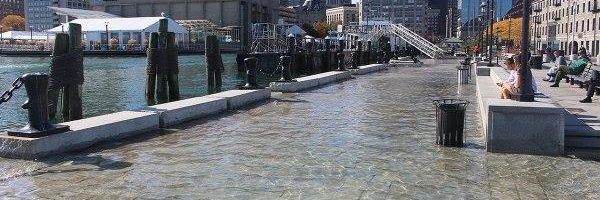
Boston thinks short and long term to prepare itself for a warmer future
Boston, with its cold and snowy winters, might be expected to be one of the first cities to dismiss the threat of climate change and embrace rising global temperatures. Sure the ski season would be a bit shorter, but summers on Cape Cod would last longer, the subway (known locally at the “T”) would suffer fewer shutdowns and the City could allocate money from its snow removal budget to more urgent needs. Although this all sounds appealing, Boston, acknowledging that its fate is closely tied to the sea, has elected to take action against the impact of climate change.
Many areas of Boston sit near sea level making the city particularly vulnerable to rising ocean levels and strong storms. Flooding, even today, represents a significant threat to private and public infrastructure and threatens the ability of the city to respond in emergency situations [1]. A recent study conducted for the City and released in June under the “Climate Ready Boston” initiative, highlights that under certain emissions scenarios, Boston could see sea levels rise an additional 8 inches by 2030, 1.5 feet by 2050 and 3.1 feet by 2070 [2]. Already, Boston has seen sea levels rise 10 inches since 1920, although half that is due to land subsidence [3].
It is not only rising sea levels that pose a threat to the City and its citizens. Rising temperatures are also expected to pose significant challenges, especially to the most vulnerable portion of the population, such as the elderly, poor and those with acute respiratory illnesses [2].
In 2007, responding to expected increases in sea levels, temperatures and other threats posed by climate change, Boston’s then mayor, Thomas Menino, issued an executive order that directed the city to reduce greenhouse gas emissions 25% by 2020 and 80% by 2050. Recognizing our ever changing understanding of climate change, the executive order requires the city to update its plan every three years [4]. To help reach this goal, the city has [4]:
- Conducted over 35,800 energy audits,
- Completed ~18,000 “weatherization, heating replacements and other upgrades”
- Installed 14.3 megawatts of solar capacity
- Reduced vehicle miles travelled per capita by 0.5%
Results from this effort, while encouraging, leave the City with a significant challenge ahead of it. From 2005 through 2013, Boston reduced greenhouse gas emissions by roughly 18%, although a majority of this reduction was the result of a “cleaner electric grid” [5]. This leaves the city with an additional 8% of reductions needed for the 2014-2020 timeframe, which will be more difficult to achieve [5].
Beyond reducing emissions, Boston has been taking steps to prepare the City in the near term by assessing vulnerabilities to municipal buildings, infrastructure and operational capabilities, assessing potential impacts to hazardous materials and sites, more closely working with insurance companies, and identifying opportunities to improve storm water management [5]. This is just a small sample of what the City is doing, but each plays an important part of making Boston more resilient to the effects of climate change.
While all of these efforts are costly for the City and its taxpayers, there are a number of positive results that should materialize beyond the direct benefit of protecting public and private infrastructure. Efforts to reduce energy consumption within the City government itself, by private citizens and via improved transportation infrastructure have the added benefit of lowering overall energy costs. These savings, assuming energy costs per unit remain stable, should result in financial savings for the city and more spending power for its citizens [6]. A second benefit of reduced emissions and is cleaner air, which has its own health and related financial benefits for the City as a whole.
While the city of Boston should realize a number of benefits from its effort to address climate change, it can and should do more. In tandem with its emissions reductions goals, the City should strongly encourage the development of green energy technology by the private sector within City limits. This would likely lead the City to gain access to the newest and most efficient technologies and could help drive economic growth that would create additional tax revenue for the City and economic opportunities for its citizens.
(695 words)
[1] Massport, “Climate Ready Boston” (PDF file), downloaded from Massport website, https://www.massport.com/media/266281/2013-October_Climate-Ready-Boston.pdf, accessed November 2016.
[2] City of Boston, “Climate Projection Consensus” (PDF file), downloaded from City of Boston website, http://climateready.boston.gov/findings#spring2016, accessed November 2016 .
[3] City of Boston, “Sea Level in Boston Harbor,” http://www.cityofboston.gov/climate/sealevelriseboston.asp, accessed November 2016.
[4] City of Boston, “Mayor Menino Announces Boston’s Climate Action Progress on the One Year Anniversary of Hurricane Sandy,” http://www.cityofboston.gov/news/default.aspx?id=6381, accessed November 2016.
[5] Greenovate Boston, “2014 Climate Action Plan Update” (PDF file) , downloaded from Greenovate Boston website, http://plan.greenovateboston.org/, accessed November 2016.
[6] The New Climate Economy, “Accelerating Low-Carbon Development in the World’s Cities” (PDF file), downloaded from The New Climate Economy website, http://newclimateeconomy.report/2015/wp-content/uploads/sites/3/2015/09/NCE2015_workingpaper_cities_final_web.pdf, accessed November 2016


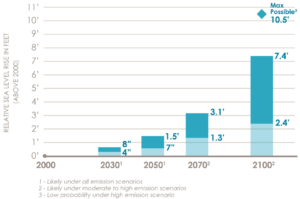
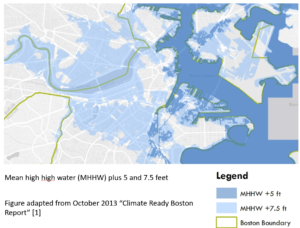


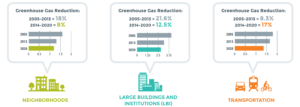
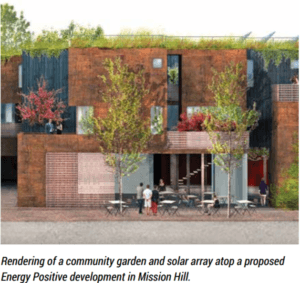
I agree that it is important for Boston to do more to address climate change. Besides issuing an executive order to the city to reduce emissions, the local government should look into partnering with all large corporations and small businesses within the city to pledge further clean energy practices. Look no farther back than two weeks ago to see how climate change is very tangibly affecting the city; King Tides, the highest tides of the year, hit Boston in one week, causing local flooding. King Tides demonstrate just how dangerous rising sea levels are. As sea levels continue to rise, King Tides will also continue to get worse, leaving the infrastructure and economy at risk. It is not just the Seaport, Financial District, and South Boston that are at risk because of their proximity to the ocean, Cambridge is also at risk because rising tides will affect the Charles River. I wonder how Boston compares to other large cities in the US in the fight against climate change?
I think it’s great that Boston is spending so much effort on reducing emissions, but it seems like most of their efforts to date have been aimed at patching existing issues vs. thinking about how to change behavior and potentially eradicate/reduce these issues in future generations. What are they doing to partner with schools to ensure that young people who do not yet have energy and lifestyle habits engrained in them learn about global warming and the best-practice behaviors? What are they doing to incentivize individuals to act more environmentally conscious in their day to day lives? This seems like a hole in their plan that needs to be addressed if they are going to reduce their emissions by 25% or even more.
This is a great post! I agree with Mike that Boston’s efforts are incremental and may not represent the structural change needed to seriously lower greenhouse gas emissions by Boston’s city government or population.
Given Boston’s disastrous traffic and parking it seems that the city could lower vehicle miles traveled by far more than the (nearly trivial) 0.5% reduction noted above. There are prosperous and popular Boston neighborhoods – the South End, Back Bay, and South Boston come to mind – that remain poorly served by public transportation. If expanding the “T” is cost prohibitive perhaps Boston could explore a modern streetcar system (as Kansas City successfully implemented) or an elevated train.
Bottom line: driving in Boston is miserable. I am surprised that Boston cannot figure out a way to convince people to do it less often. There is low hanging fruit here.
A post that really hits home!
In the post and in the above comments there are several great suggestions for doing more to address climate change. Though it seems that cities are in the unfortunate position where the effects they’ll face are almost entirely disconnected from the individual actions they’ll take given the global nature of global warming’s dynamics (though Boston is part of a Compact of Cities trying to coordinate city responses to climate change – https://www.compactofmayors.org/cities/boston-ma/).
I particularly liked the suggestion at the end of the piece that Boston take the lead as a hub for the development of new technologies and businesses helping cities adapt to global warming. Given the world class universities in the greater Boston area, this seems like a unique way Boston could take the lead and help cities all around the world through its efforts.
I’m always interested in how cities or countries that will be most impacted by climate change decide to take steps to mitigate its impact. Unfortunately, no matter how much Boston reduces its own greenhouse emissions, these steps will ultimately do very little to slow down rising sea levels. While it is commendable that Boston is putting forth a great effort to reduce its own carbon footprint (and it should continue with these initiatives), I think it is far more important for Boston to start planning for the inevitable reality that will face it in the future. Unfortunately, I do not have enough expertise to know what types of practical steps can be taken to help mitigate the impact of climate change and rising sea levels will have on Boston. However, I do think that a majority of resources should be dedicated to planning for the inevitable future instead of focusing so heavily on reducing its own carbon footprint. (To be clear, I think Boston should continue to do its part to reduce its impact on climate change. However, its primary focus should be on planning for rising sea levels and what can be done to the cities infrastructure to mitigate the impact from climate change.)